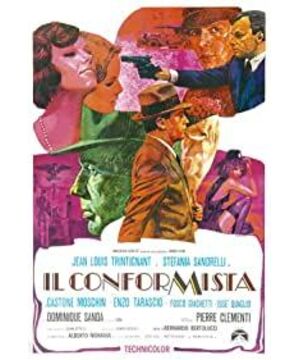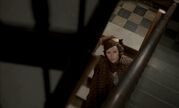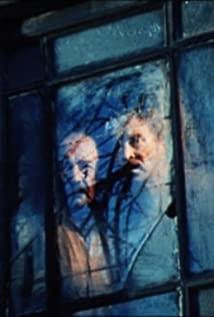After watching the 1970 film "The Conqueror " , we can be more sure that Bernardo Bertolucci has definitely reached the level of a master of film.
The director’s most successful work is "The Last Emperor" in 1987 .
The best film of the 60th Academy Awards.
He is a Westerner, how did he successfully promote the things in Eastern culture to the whole world?
The answer is one word.
people.
"The Last Emperor" focuses on the protagonist Pu Yi, whose sad destiny is the rope that touches the hearts of the audience.
The same goes for "The Conqueror " , except that the protagonist has changed from the last emperor of the Qing Dynasty to a fascist.
The two films have many similarities, or in other words, both have Bernardo Bertolucci's personal style and themes.
Extremely sophisticated photography, composition, light, color use, and unpredictable narrative with the function of conveying ideas;
The content is about the impact of politics and sex, identity and class, and social environment on individuals.
The background of " The Conqueror " is placed in World War II, when Italy is under fascist rule.
The protagonist Marcelo is a member of a fascist organization. The main storyline tells that he accepts a new mission to go to Paris to assassinate his professor Quadri at his university.
The narrative perspective follows Marcelo firmly.
Dive into his personal life.
And his personal memories.
The plot goes on in a series of reversals.
At the beginning, with the change of red and blue tones, Bertolucci directly released a plot bomb.
There is a woman without clothes sleeping in Marcelo's house, and the relationship between the two is only shown by one action.
After Marcelo went out, he first dealt with the work, then bought a bunch of flowers and went to the house of his fiancee Julia.
So who the woman in his family is, has become a time bomb.
When having dinner with his fiancée and future mother-in-law, the lines initially revealed Marcelo’s family situation.
His father is mentally ill and has malicious people, trying to use this pain point to get the future mother-in-law to stop his marriage with Julia.
Then the plot broke into Marcelo's family.
Regarding the true identity of the woman in his family, the true situation of his father was revealed one by one.
There is only one flashback in the whole film.
After explaining Marcelo's family background, Bertolucci unexpectedly brought the audience to Marcelo's childhood through subtle montages.
This flashback drama became an important turning point.
From the beginning, Marcelo, a "normal person" who was about to harvest both career and love, suddenly became an "abnormal person" with a complicated family background and a dark childhood.
There is a reasonable but unexpected reason why he wants to join the fascist and why he wants to marry Julia.
Everything is to become a "normal person".
This is the meaning of the title "The Conqueror " , and it is more appropriate to use another title.
That is "the one who goes with the flow".
In the church scene before going to Paris to perform the mission, Marcelo’s dark side began to release, and at the same time his and Julia’s seemingly good relationship, ushered in a reversal.
As a result, the two's trip to Paris became more subtle.
Probably to prevent Professor Quadri from being suspicious, Marcelo went to visit with Julia in the name of her honeymoon.
In the scene where the two met in the office, Bertolucci hinted at the psychology and destiny of the two using the change of light.
The opening and closing of windows, the appearance and disappearance of shadows all have profound meanings.
Professor Quadri is an anti-fascist, he stands on the opposite side of Marcelo. The contrast between the two of them couldn't be more obvious.
When the professor's wife Anna first appeared on the stage, the audience could feel strongly that a desire was fermenting.
Such a beautiful woman would be liked by a "normal" man.
Marcelo, who wants to be a "normal" man, has a stronger reason than other men to make a move beyond boundaries to Anna.
What's more, being close to Anna is conducive to the assassination.
But the human heart is always made of meat.
Marcelo joined the fascist organization only because of the prevalence of fascism in his country. He was just a person who wanted to go with the crowd and did not really believe in fascist dogma.
I have been with Quadri and Anna for a long time. One is with him and also a teacher and friend, and the other has an ambiguous relationship with him. How can he get it personally?
Bertolucci has always told the story very calmly, only the superb lens language is used to express the character, and he does not use particularly sensational means to express the entanglement and struggle of the character in order to win the empathy of the audience.
The assassination proceeded coldly in this way.
Naturally, the fascist organization would not stand idly by. Seeing Marcelo lagging behind, they asked someone to push him.
After all, Marcelo is just a small person, he can't stop the claws of fascism at all.
What he can do is try to make himself look like a "normal person".
The forest assassination scene is the most thrilling scene. After a series of foreshadowings, the story reached a climax here.
Marcelo's selfishness and cowardice, as well as condemnation from his conscience, are silently hidden in the image.
Without any soundtrack, Bertolucci let the emotional atmosphere torn apart naturally.
He did what a film master should do.
In the end, Fate made an ultimate joke for Marcelo.
Fascism in Italy fell apart with the fall of Mussolini.
The people who still admired Mussolini the day before, those who followed the crowd, overnight became the people who scolded Mussolini's ancestors for eighteen generations.
Marcelo didn't scold Mussolini, he, a fascist, just changed from a "normal" to "abnormal".
Those who wanted to make himself "normal", but worked hard to pursue everything, eventually became a piece of iron in his life.
There seems to be no change in the marriage with Julia, but Bertolucci uses a wall and the contrast of warm and cold lights to tell the audience that the two are already in the same bed and have different dreams.
It would be too straightforward and boring to let them express themselves in a big fight.
All efforts are in vain.
The last fascist friend found Marcelo, and he agreed without hesitation, even Julia knew that this might be a trap.
Marcelo, whose mentality has collapsed, doesn't care about life or death anymore. He just wanted to feel what it was like as a "normal person" when working with fascists.
It's just that the reality on the street quickly shattered his fantasy.
He must be a "normal person" back.
He didn't know what to do, and could only angrily accuse the "abnormal" people around him to show that he was "normal".
He couldn't escape the cage of memories after all.
Because it was his past that drove him to aspire to be a "normal person."
" Fellow " is a tragedy from the beginning to the end.
A person was born in a deformed family and grew up in a distorted country.
Unfortunately, he could not save himself.
Sadly, no one can save him.
He can only be a person who goes with the crowd, at least in this way, it can also bring a touch of psychological comfort.
Can people who cannot change the world change themselves?
View more about The Conformist reviews











